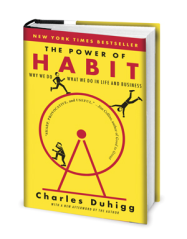
Okay, sometimes it’s not easy
I’ve written a few posts talking about what I do to keep writing. After fielding a few responses, I realized that what I’ve posted up to now were pretty much along the lines of “Just do it.”
People wrote or grabbed me to say, “Hey! I’ve tried to write (or exercise) on a regular schedule and I just can’t keep it up. It’s all very well for you to say, “Just do it.” What if that doesn’t work for me?”
Fair question. Developing good habits is hard. Getting rid of bad habits is hard. Anyone who pretends otherwise is an annoying prig, like this girl I knew in high school, Angel McPrissyface. Here’s the background: I experimented my junior and senior years with smoking a cigarette while walking into a liquor store, hoping that smoking made me look old enough to buy alcohol. Since beer-and-wine age in Illinois at that time was something like 19, it worked better than it probably would nowadays. Ah, my halcyon youth! But the point isn’t that I was a degenerate who bought alcohol before I was old enough to drink legally. The point is, I was a degenerate who learned to smoke.
If you have never smoked, I cannot possibly convey how addictive nicotine is. By the time I was halfway into my freshman year of college, I was definitely a smoker. So: I smoked for maybe a year, maybe a year and a half. It took nearly as long to quit as it did to get hooked. I might still be smoking if BK, who I was dating at the time, refused to kiss me as long as I smoked. No question, kissing beats smoking.
Anyway, while I was home from college that summer, kissing was not an available smoking substitute. I was in Illinois, and BK was in Tennessee. I mentioned to someone I knew, who was still in high school, that I was having a hell of a time quitting. She put this prissy look on her face and said, “Well I never started!” as if I ought to give her a medal, or at least a cookie. Good thing I had a friend who heard the exchange and said Angel McPrissyface was an annoying little prig. Which she was.
I would like not to be like Angel; definitely not the kind of person who says things like, “Just do it.” (Sorry, Nike, but seriously). In the service of that ideal, I am coming clean. I didn’t always write every day, or exercise 5-6 days a week. I started the exercise habit first, and eventually got around to the writing habit.
And here’s something else I hate to admit. Unlike Stephen King, I don’t write 2000 words of usable fiction every day. I write at least 750 words of something. Sometimes it is dreck: just a mind dump. That’s certainly how I started. Or sometimes what I write is a blog post, like this one. I hope this isn’t dreck, but I’m not in a position to judge.
Finally, after well over two years of using 750words.com faithfully, the proportion of fiction to dreck is slooowly inching in the direction of more fiction, less dreck. Usually that happens best in November, or any other time when I’m able to write 2000 (or so) words daily, rather than just 750. Even so, much of that fiction might be a later draft, and much of what I’m doing in a later draft is actually cutting words I’ve written earlier. Transforming myself into a prolific fiction writer is definitely a work in progress.
So…I belatedly realized that when I posted (in my 3-Legged Stool entries) some of the reading I’ve found helpful , I left one really important book out:

The Power of Habit by Charles Duhigg
The Power of Habit may or may not help you, but it was a relatively quick read, and it got me back on track when I hit a rough patch.
But let’s say you don’t want to buy the book or you’re too busy (or cold, if you live by me) to go to the library. Here are a couple of interesting posts on using the peculiarities of your brain to trick yourself into good habits:

Graphic from Robbie Blair’s site
I liked this post by Robbie Blair. He offers 14 ways to make it easier to start a writing habit. He mentions Charles Duhigg’s book, too, so maybe it’s not just me.

Graphic from Wait But Why site
And this post by Tim Urban (maybe with help from Andrew Finn?) was entertaining and seemed to have more than a kernel of truth about procrastination.
